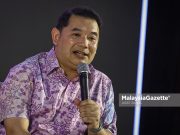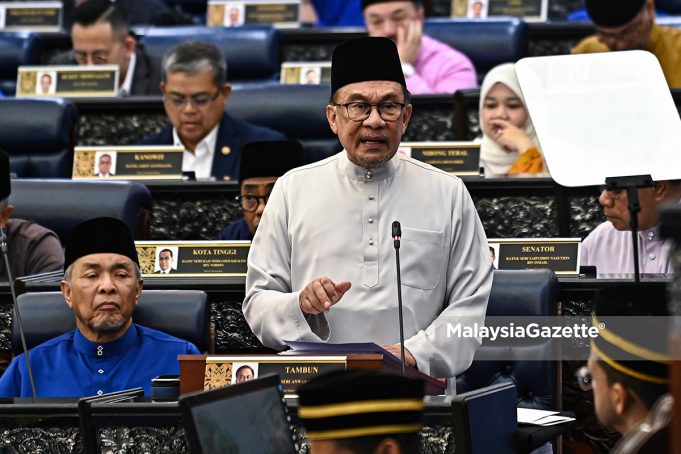THE Malaysian Budget 2025, unveiled by Prime Minister Datuk Seri Anwar Ibrahim on October 18, 2024, marks a significant turning point in the nation’s economic strategy. With an unprecedented allocation of RM421 billion, this budget is not only the largest in Malaysia’s history but also encapsulates a vision for sustainable growth and fiscal prudence. The overarching theme, ‘Membugar Ekonomi, Menjana Perubahan, Mensejahtera Rakyat’ (Reinvigorating the Economy, Driving Reforms, and Prospering the Rakyat), reflects the government's commitment to addressing immediate socio-economic challenges while laying the groundwork for long-term prosperity.
Economic outlook and growth projections
Budget 2025 illustrates the government’s dedication to revitalising the economy while maintaining fiscal discipline. The budget responds strategically to both domestic challenges, such as inflation and the rising cost of living, and international pressures, aiming to stimulate economic growth while ensuring equitable benefits across all societal segments. The economy is projected to grow between 4.5% and 5.5% in 2025, driven by strong domestic demand and strategic investments in critical sectors, including technology, manufacturing, and renewable energy. These investments are expected to generate higher wages and better employment opportunities, ultimately improving overall living standards and addressing post-pandemic cost concerns.
Development expenditure
A total of RM421 billion has been allocated for Budget 2025, marking a 6.9% increase from 2024. Of this, RM335 billion is earmarked for operating expenditure, while RM86 billion is reserved for development projects, with an additional RM2 billion set aside as contingency savings. This balanced allocation demonstrates a strong commitment to addressing both immediate operational needs and long-term developmental objectives, including infrastructure, healthcare, and education.
Social welfare
Key social welfare initiatives include a minimum wage increase from RM1,500 to RM1,700 per month, effective February 2025, aimed at helping low-income workers cope with the rising cost of living. Additionally, various cash assistance programmes will be implemented, including RM600 for single Malaysians and RM150 million allocated for infrastructure improvements to mitigate flash floods. These measures are designed to strengthen social safety nets and uplift the most vulnerable populations.
Investment incentives
To bolster investment, the government will introduce a new Investment Incentive Framework in Q3 2025. This framework targets high-value sectors such as Artificial intelligence (AI), robotics, and sustainable technology, with special tax incentives aimed at attracting foreign investment and fostering local industries' competitiveness. Additionally, RM40 billion has been allocated for loan facilities to support small and medium enterprises (SMEs), including RM3.2 billion for micro-sized loans and RM20 billion in SME financing guarantees, empowering local businesses to thrive.
Education and digital transformation
The Education Ministry will receive a historic allocation of RM64.1 billion, reflecting the government’s commitment to improving educational infrastructure and fostering a skilled
workforce. This investment focuses on key areas like digital education, Science, Technology, Engineering and Mathematics (STEM) programmes, and technical and vocational training (TVET), ensuring Malaysians are well-equipped for the future economy. Digital transformation plays a significant role in Budget 2025, with USD16.9 billion (US$1 = RM4.30) secured for digital investments. Tax incentives will encourage the adoption of AI technologies across industries, positioning Malaysia as a regional leader in the digital economy. These initiatives will not only attract international investment but also prepare Malaysia’s workforce for future demands.
Environmental sustainability
Recognising the importance of environmental sustainability, the budget allocates funds for renewable energy projects and technological advancements in agriculture to reduce reliance on foreign labour. Projects such as the Kenyir Hybrid Hydro Floating Solar Farm and green hydrogen initiatives demonstrate the government's commitment to addressing climate change while promoting economic growth.
Fiscal discipline and revenue generation
The government aims to reduce the fiscal deficit from 4.3% of Gross Domestic Product (GDP) in 2024 to around 3% by 2026. This goal will be supported by the rationalisation of subsidies, particularly for fuel, and the expansion of the Sales and Service Tax (SST) in May 2025. These reforms aim to ensure long-term fiscal sustainability while minimising the impact on low-income households.
To enhance revenue generation, the government has opted not to reintroduce the Goods and Services Tax (GST). Instead, it will implement alternative measures, including a 2% tax on dividend income exceeding RM100,000 and the expansion of SST to cover additional services and non-essential goods. These strategies aim to strengthen the government’s fiscal position without placing an undue burden on essential services.
Challenges ahead
However, Malaysia’s Budget 2025 faces key challenges. Limited fiscal capacity could hinder infrastructure projects and growth. The rationalisation of subsidies may face some public concern, especially among low-income groups. Economic dependence on global factors adds vulnerability to external downturns. Tax reforms, like expanding SST, may face resistance, impacting business compliance. Inequality in resource distribution and bureaucratic resistance to public service reforms could further limit effectiveness. Lastly, increased borrowing may raise national debt concerns, affecting future fiscal sustainability.
Proposed improvements
To improve Malaysia’s Budget 2025, several adjustments could enhance its impact. Increasing the development expenditure beyond RM86 billion would allow for more robust infrastructure investments, potentially stimulating greater economic growth and job creation. A more gradual and well-communicated approach to subsidy rationalisation, especially for fuel subsidies, could minimise public backlash and ensure smoother implementation without disproportionately affecting low-income groups.
Diversifying revenue sources beyond taxes like SST and dividend income, such as through green bonds or digital economy taxation, would provide more resilience against global economic fluctuations. Stronger monitoring systems to ensure equitable distribution of welfare benefits, especially for marginalised communities, could enhance social welfare effectiveness.
Additionally, focusing on debt management through public-private partnerships for development projects would help control national debt while maintaining fiscal sustainability. These measures would offer a more balanced approach, supporting long-term growth and resilience.
Moreover, the removal of subsidies for Malaysia’s T15 group is a complex issue that intertwines economic policy with social equity considerations. While aimed at creating a more equitable distribution of resources and reducing fiscal burdens, these measures must be implemented thoughtfully to avoid unintended consequences such as increased living costs and social unrest.
Budget 2025 represents a comprehensive approach to addressing Malaysia’s immediate economic challenges while laying a foundation for sustainable, long-term growth. The budget reflects a commitment to social welfare, education, digital transformation, and environmental sustainability, all while balancing growth with fiscal discipline. As Malaysia navigates the post-pandemic global landscape, this budget serves as a strategic roadmap to inclusive recovery and future prosperity.

Dr Paul Anthony Maria Das is a Senior Lecturer for the School of Accounting and Finance at Taylor’s Business School, Faculty of Business and Law, Taylor’s University.

















